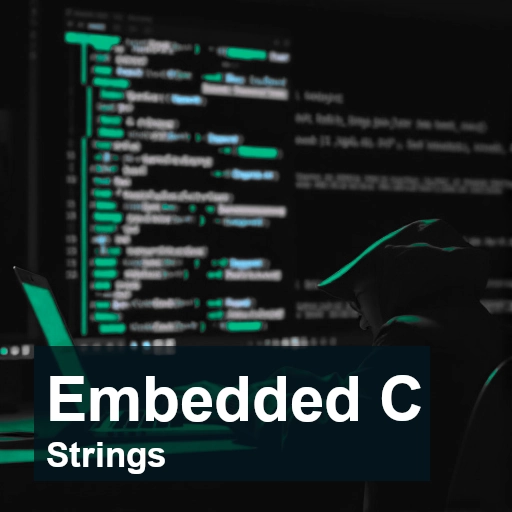In C programming, strings are sequences of characters stored in an array of characters. While C does not have a built-in string data type like many modern programming languages, strings are handled through arrays of characters. Understanding how to work with strings in C is fundamental for any programmer.
What is a String in C?
In C, a string is simply a character array terminated by a special null character (‘\0’). This null character is used to mark the end of the string, allowing functions to determine where the string ends.
For example, a string “Hello” in C is represented as:
char str[] = "Hello";Internally, it is stored as an array of characters like:
'H', 'e', 'l', 'l', 'o', '\0'The null terminator (‘\0’) is crucial because it tells functions when to stop processing the string.
Declaring and Initializing Strings
Strings can be declared and initialized in various ways in C.
Using a character array:
char str[10] = "Hello";Here, the string “Hello” is stored in an array of size 10. The null terminator ‘\0’ is automatically added at the end of the string, and the remaining space in the array is filled with empty characters.
Using a string literal:
In this case, the size of the array is implicitly determined by the compiler based on the length of the string (including the null terminator).
char str[] = "Hello";Using pointers:
char *str = "Hello";Here, str is a pointer to the first character of the string. This method is often used for string literals or when working with dynamic memory allocation.
Common Operations on Strings in C
Working with strings in C requires using various functions provided by the C standard library (defined in ). Here are some common operations:
#include <string.h>
int main (){
// The strlen() function returns the length of a string (excluding the null terminator):
char str[] = "Hello";
int len = strlen(str); // len = 5
// The strcpy() function copies one string into another:
char str1[] = "Hello";
char str2[10];
strcpy(str2, str1); // Copies "Hello" into str2
// The strcat() function appends one string to the end of another:
char str3[20] = "Hello";
char str4[] = " World";
strcat(str3, str4); // str1 becomes "Hello World"
// The strcmp() function compares two strings lexicographically:
char str6[] = "Hello";
char str7[] = "Hello";
int result = strcmp(str6, str7); // result = 0 because strings are equal
// The strncpy() function copies a specified number of characters from one string to another, which helps avoid buffer overflows:
char str8[] = "Hello World";
char str9[6];
strncpy(str8, str9, 5); // str9 becomes "Hello"
str9[5] = '\0'; // Ensure null terminator is added
// iteration using pointer
char str11[] = "Hello";
char *ptr = str;
// Print each character using a pointer
while (*ptr != '\0') {
printf("%c ", *ptr);
ptr++;
}
return 0;
}Dynamic Memory Allocation for Strings
In C, strings can be dynamically allocated using malloc() or calloc(). This is particularly useful when the size of the string is not known in advance.
#include <stdio.h>
#include <stdlib.h>
#include <string.h>
int main() {
char *str;
str = (char *)malloc(50 * sizeof(char)); // Allocate memory for a string of 50 characters
if (str == NULL) {
printf("Memory allocation failed\n");
return 1;
}
strcpy(str, "Dynamic String");
printf("Allocated string: %s\n", str);
free(str); // Free allocated memory
return 0;
}
Conclusion
Strings in C are fundamental to many applications, but they require careful handling due to the lack of a native string data type. By understanding how strings are stored, manipulated, and managed in memory, programmers can write more efficient and safer C programs. Always be mindful of buffer sizes, null terminators, and memory allocation when working with strings in C.

